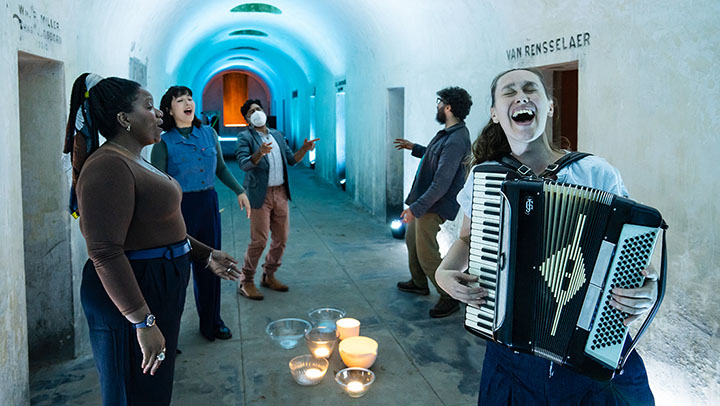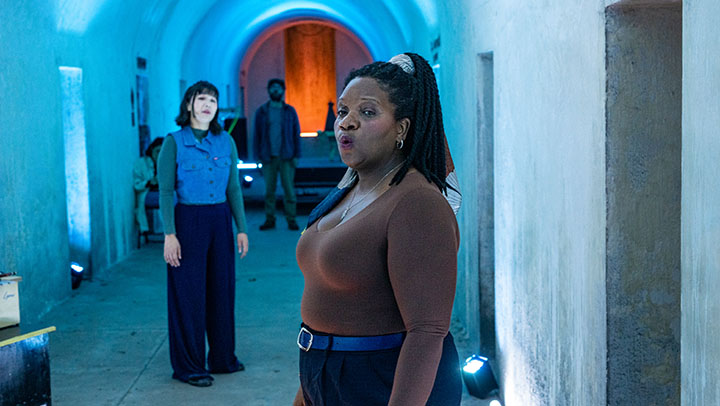Gelsey Bell’s piece, the title of which, a phonetic alphabet rendering of the word pronounced either morning or mourning, is beyond the text display capabilities of parterre box, is a sweet and whimsical piece of speculative fiction that stretches its imaginative powers to a distant future, long after some unnamed catastrophe has wiped humanity from the earth.
Staged in the catacombs of Brooklyn’s Green-wood Cemetery, this iteration of [morning/mourning] was a trimmed and simplified version of the piece that premiered at last year’s Prototype Festival—the “MTV Unplugged version” as Death of Classical Artistic Director Andrew Ousley referred to it before Thursday’s performance.
About those catacombs: Death of Classical has fulfilled the spirit of its name by staging concerts in crypts and cemeteries, and the Green-wood Cemetery, with its sprawling hills, its serene trees, and its centuries of history makes for a particularly compelling venue. Narrow, largely unadorned, with curving walls and low ceilings, the catacombs date to the 1850s and resemble the interior of a submarine carved from cool gray stone.
The catacombs were not only a visually striking locale for [morning/mourning]; the long stone hallway proved an acoustic match for Bell’s densely textured compositions. Sung by five voices and accompanied by an eclectic mix of instruments including accordion, handheld harp, and synth drone, the piece’s music was heavy on sweeping hums and tone-clustered waves of overlapping sound. This wide-open vocal quality was amplified by the catacombs, with the resonating chambers of the singers’ chests mirrored and magnified by the resonating chamber of the stone walls.
Elsewhere, Bell’s music was folksy and melodic, approaching the themes of extinction and disaster with a surprisingly buoyant affect. In fact, the ensemble presented the piece’s lightly-sketched narrative—human extermination followed by the emergence, evolution, and eventual collapse of a new, post-human species, all traced across several million years—with an oddly upbeat directness.
In moments of spoken monologue, where the performers narrated the trajectory of the Earth’s ecosystem or the rise and fall of the “Blueklungs” (a kind of intelligent octopus), the effect was that of a particularly surrealistic Nature Channel documentary. It was an unexpected tone for the cold stone and moody ambiance of the catacombs—an odd juxtaposition that I’m not sure really worked. The acoustic value of all that marble aside, the piece’s expository tone seemed to want a planetarium, not a mausoleum.
Easing the way was the cast of five singers, including Bell herself, as well as Aviva Jaye, Brian McCorkle, Mia Pak, and Paul Pinto, who presented this material with an eerie kind of charm, smiling placidly at the audience while they relayed the migratory patterns of the ever-evolving Blueklungs. All five singers had strikingly unique vocal tones—and more striking still for their ability to blend seamlessly together in moments of ensemble singing.
Often, the piece’s grand-scale narrative was supplemented by a kind of montage aesthetic, presenting image after image of life after human society: a yard littered with broken tile, fragments of a tea-pot with the paint rubbed off, an animal naively crossing a former national border. In one song, a playfully nostalgic take on the human customs of the world that was, a singer reminisces, “I liked their sustaining fealty to two-dimensional imagery in rectangular frames.” A charmingly alien description of photography, yes, but “a sustaining fealty to two-dimensional imagery” also makes a fair description of Bell’s libretto.
This combination of an unfathomably large timescale and an attention to single snapshot images accentuated what I imagine is the primary concept of the piece: the idea that on a long enough timeline, all seeming catastrophe subsides into stability, just as all seeming stability is actually slow-moving catastrophe.
Perhaps this is a comforting thought, particularly in a geopolitical moment given to catastrophe that feels very fast-moving indeed. Perhaps, on the other hand, this is the comfort of nihilism—there is no need for urgent action if disaster is so inevitable, so natural. It’s a thorny contradiction, one well suited not only to our ongoing lives in the shadow of encroaching climate catastrophe but also to a show that places whimsical invention within the quiet halls of the long-dead. Whatever comes next, [morning/mourning] seems to assert, it might as well be beautiful.
Photos: Steve Pisano





